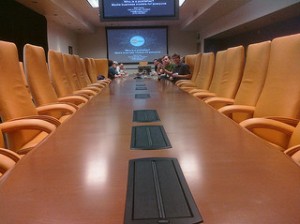The humorous aspects of CareerCast’s Comprehensive Ranking of 200 Different Jobs come from (a) some charmingly improbable job descriptions, and (b) results produced when the matching engine returns “related” job listings. My personal favorite is Philosopher, which ranks as the twelfth best job and has the following job description:
Studies questions concerning the nature of intellectual concepts, and attempts to construct rational theories concerning our understanding of the world around us.
I actually haven’t been able to think of a single person in history who had this job. For a living, philosophers (even Socrates!) typically teach–and “Teacher” ranks 127, right after “Vending Machine Repairer.”
To be fair, the job description for Teacher plainly refers to the K-12 variety, not to college teachers, and there is no listing for Professor. But as we all know, MANY people with degrees in philosophy are lucky if they can get a job teaching high school.
So, speaking of jobs . . . what’s available for job hunters who want to “study questions concerning the nature of intellectual concepts”? The first three listings returned on CareerCast are, fairly enough, college teaching positions. Followed by: “Facilities Loss Prevention Engineer” and several positions for life guards and swim instructors. Along with jobs in health care and restaurant management.
The job ranked number one by JobsRated–Mathematician–actually has a very realistic description:
Applies mathematical theories and formulas to teach or solve problems in a business, educational, or industrial climate.
And there are many non-teaching jobs for Mathematicians! Really good jobs, with the Federal Government, Booz Allen Hamilton, Gaming Laboratories International, et cetera. And according to JobsRated, a typical Mathematician salary is around $100,000 a year.
Plus–Mathematician rates very low on the “Own life at risk” factor. So clearly, it’s a dreamy job.
Yet there is a problem. How many of you readers could have chosen to be a Mathematician if you’d realized what a great job it is? They might just as well have announced that the most desirable career is “NBA Point Guard” or “Concert Pianist” . . .
In reality, being a mathematician requires native abilities as well as training. And it appears that being good with numbers is a huge asset in today’s job world, since three of the top twenty spots (Mathematician, Physicist, and Astronomer) require very high levels of math ability, while seven more (Actuary, Statistician, Software Engineer, Computer Systems Analyst, Accountant, Economist, and Computer Programmer) require very good math skills, and four others (Industrial Designer, Biologist, Economist, and Meteorologist) also have a significant math component. That’s fourteen of twenty, or 70%.
What can you be in the top twenty if you didn’t do well in math? A Philosopher! Or a Sociologist. Or a Historian. And if you just don’t want to teach for a living–a Parole Officer.
By now it may seem as if I am merely poking fun in this second part, with no constructive purpose. To keep that from being true, I will add what I think are two important takeaways:
1. Job search engines often perform absurdly. Obviously, the jobs returned for Philosopher are just those happening to contain the term “philosophy,” as in “Ability to interpret YMCA Aquatic program philosophy.” And CareerCast is certainly no worse in its matching than most job boards. Job seekers and recruiters should demand better.
2. The career advice industry frequently seems divorced from reality. It really doesn’t matter whether math jobs are great if you’re not a math person, and Philosopher is not a career choice, even if you are philosophical. Here again, CareerCast is not worse than most–and they have clearly put effort into research for this list. But it takes thoughtful analysis to turn raw data into useful information.
Final thought: The bottom jobs in the comprehensive list are all by definition high stress and high risk. Does that make them “bad”? Some Lumberjacks (#200) undoubtedly enjoy their jobs more than some Medical Laboratory Technicians (#16). So JobsRated also published a list of the 10 Most Satisfying Jobs, as determined by the University of Chicago’s National Opinion Research Center. And it turns out that “Firefighter,” which is near the cellar (#181) on the JobsRated list, came in at a very happy number three in terms of satisfaction.
Could your corporate Careers site highlight “satisfaction factors” more effectively?
Thanks to Kevin Dooley and his Vivitar for providing a philosopher’s viewpoint on surfing.
Cynthia Giles has followed a serpentine career path from academia to publishing to marketing and design to information technology and corporate communications. There’s plenty of detail about this journey at www.cynthiagiles.com, but briefly--the common theme has been ideas, and how to present them effectively. Along the way, she became an accidental expert on data warehousing and business intelligence, and for the past ten years she has combined corporate contracting with an independent consulting practice that focuses on marketing strategy for smaller businesses and non-profits.
Having spent quite a bit of time looking for work, and anywhere from two weeks to two years inside a wide variety of American companies—she has given much thought to what works (and what doesn’t) when it comes to creating a great employment fit.


being a computer programmer myself makes me very proud of my job:’;